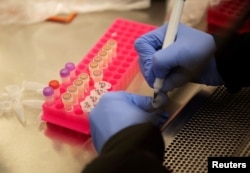An international collaboration led by researchers in Canada and Brazil is applying innovative funding and testing methods to determine whether existing medications can provide cheaper and more effective treatments for COVID-19 and is encouraged by its initial results.
Calling it the “TOGETHER Trial,” researchers predominantly in Brazil and Canada refer to their method as “adaptive platform clinical trial,” which permits several potential treatments to be tested simultaneously, reducing costs and the number of people who need to be tested.
The researchers have also speeded up the search for effective COVID treatments by relying on financing and support from private foundations, universities and the private sector, rather than the time-consuming process of seeking government funding.
One such trial conducted in Brazil beginning in June 2020 found fluvoxamine, a common anti-depressant, helped reduce hospitalization and death of COVID-19 patients by 32%.
Ed Mills, a clinical epidemiologist who teaches at Ontario’s McMaster University, is helping to coordinate the project from offices in Vancouver, Canada. He explained the “adaptive platform” model in which more than one drug is tested at the same time.
“Typically, in a clinical trial, you expect to see a drug versus placebo,” Mills told VOA. “Well, in our circumstance, we're doing five drugs versus placebo, six drugs versus placebo.”
While uncovering promising data on fluvoxamine, discovering what does not work has been equally important. Mills said the group’s trials showed that hydroxychloroquine, lopinavir, metformin, doxazosin and ivermectin do not help prevent hospitalization from COVID-19.
Two of those drugs, hydroxychloroquine and ivermectin, gained notoriety in the United States as some COVID-19 patients have insisted on taking them despite warnings by U.S. health officials that the drugs are ineffective at best for treating a coronavirus infection.
Amid a global wave of infections driven by the omicron variant, the project is recruiting about 100 participants a day, with trials now underway in South Africa, Pakistan and Brazil. About 5,000 people have participated to date in the trials, which currently involve about 2,500 people.
Mills said the researchers are studying several other existing drugs, and combinations of those drugs, to gauge their effectiveness.
“One would be a drug called peginterferon lambda, which is a single subcutaneous injection, single-dose drug to treat COVID. I'm extremely optimistic about that. We're also now evaluating combination strategies,” he said.
“So, we know that fluvoxamine works. We also know that budesonide works — an inhaled steroid. What would happen if you put them together? So, I think that's going to be a really great, cheap intervention that can be applied,” he said. Both drugs are widely available and — in some countries — economical.
Mills said he expects further results within the next few weeks.
Dr. Brian Conway, the medical director of the Vancouver Infectious Diseases Centre, sees the work being conducted by the TOGETHER Trial as a model for some future medical research.
New medications require rigorous and time-consuming clinical trials before they can be approved for use, he noted. But progress can be quicker “if a medicine’s been around for a while, it's been licensed, it's available for sale, and you're trying to decide if there's a new indication for it.”
Conway, who is not involved with the TOGETHER Trial, was also impressed with the researchers’ methodology.
"I think that going forward, they're quick. They are rigorous. They generate the kind of information that we need to help guide clinical practice,” he said. “These adaptive platforms are, to my mind, a very appropriate way of figuring out if they work against something for which they have not yet been tested or approved.”
Conway also sees the program as a good way to counter unsubstantiated rumors about unproven medications.
"And it avoids us from getting into a situation where someone says, ‘I gave this treatment to eight or 10 people and it saved their lives. So you should do this, too,’” he said.
"That's not how we should do science. That's not how we should practice medicine, especially in the era of COVID,” he said. “And it helps us be rigorous, responsive, and as helpful to our patients as we can be.”
Among the takeaways from the studies, according to Mills, is that the “Global South” — developing countries in the Southern Hemisphere — has a lot to teach the so-called “Global North,” or more developed nations.
“Although we are the ones that tend to come up with the rules on epidemiology, they're the ones that apply those rules on epidemiology and have practical experience,” he said.
“If you think about a country like Rwanda, for example, where I've spent a long time, they deal with Ebola monitoring all the time, they deal with malaria, deal with HIV all the time. They're very, very experienced at infectious diseases,” Mills said.
This is not the first time Vancouver has played a role in advancing epidemiology. MRNA vaccines developed by Pfizer and Moderna rely on lipid nanoparticles to enter human cells. That technology was first researched at the University of British Columbia in the late 1970s.





